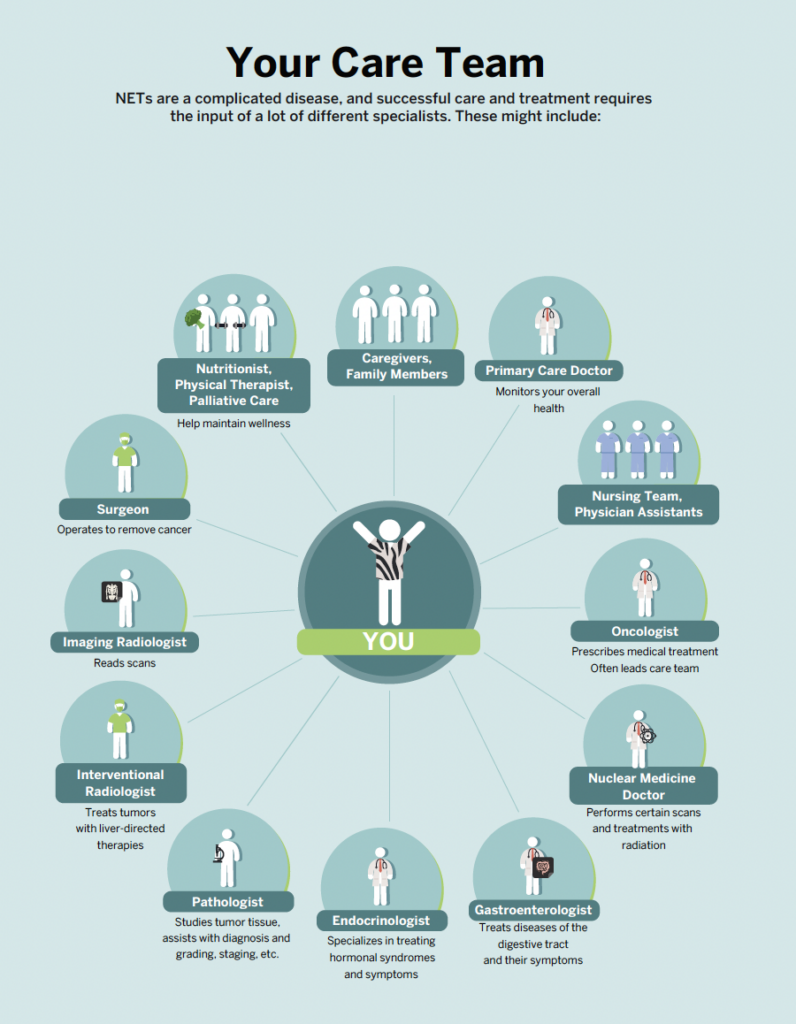Make a gift before the end of the year to drive research breakthroughs in 2026.
Home » For Patients » Finding Care for NETs
People who have a NET can face challenges to get an accurate diagnosis and find specialized care. Since NET symptoms may mimic those of other common conditions such as irritable bowel syndrome, menopause, or asthma, many people are at first misdiagnosed.
Some physicians have never seen a patient with a NET. Patients who have an uncommon cancer like a NET and their families often must advocate for themselves to receive specialized care in a complex health care system.
A standard piece of advice you will hear frequently is to find a NET specialist. If you have a NET, it is important to build a care team based on the type of NET you have and your specific needs.
The term “multidisciplinary” describes an approach to treatment planning that relies on a team of different types of doctors and health care providers. This team meets regularly, sometimes at conferences called “tumor boards,” to review a patient’s medical history and test results. Members of the team offer input based on their specialized experience and training. With the input of the experts and an understanding of the patient’s wishes and goals, the team comes up with a treatment plan. The makeup of a multidisciplinary team can vary depending on a person’s medical needs.
The task of finding a physician can seem daunting, but NETRF makes it easier for people to find doctors who specialize in the treatment of neuroendocrine cancer. NETRF has a database of U.S. NET specialists as well as a listing of U.S. cancer centers that have multidisciplinary NET treatment programs.
NETRF’s YouTube channel features talks by health care providers who specialize in NETs. Looking at these videos may also help you find a NET specialist.

Check out NET advocacy and patient support groups to find NET specialists. These groups, run by patients and caregivers, meet in communities across the U.S., both in person and virtually. Organizers and participants typically know a lot about the physicians in their areas.
When looking for NET specialists, check out the professional associations for physicians who focus on NETs. Looking at the physicians who are active in these societies can be another way to identify a physician specializing in NETs.
Physicians who specialize in NETs may be conducting clinical research. You can search on PubMed or Google Scholar for scientific articles about your diagnosis. Look at the names and institutions of the authors or look for physicians conducting NET clinical trials at clinicaltrials.gov.
Once you find the right doctor, it is important to build rapport and maintain good communication. Doctors’ appointments can at times be overwhelming. You may hear so much information that it is hard to take it all in or understand all of it. During visits, it may seem like there is never enough time to ask all your questions. To make the most of your appointments, consider some of the following suggestions.
Some physicians have never seen a patient with a NET. Patients who have an uncommon cancer like a NET and their families often must advocate for themselves to receive specialized care in a complex health care system.
The increased use of telemedicine, which has accelerated during the COVID-19 pandemic, has created new opportunities for NET patients. Virtual appointments are now helping some NET patients across the country to reach out to NET specialists and stay in contact with their own physicians.
There may be licensing limitations on whether an out-of-state physician can have a virtual visit with you and insurance companies have different rules on whether they will cover telemedicine. That said, it is worth asking about telemedicine, especially if you would need to travel a long distance for an in-person appointment.
Ask if your physician has a patient portal. Some patient portals allow you to message your health care provider and request appointment changes or prescription refills. Download any needed telehealth apps on your phone or tablet. Get familiar with these digital tools so you can use them to maintain communication with your care team.
It is important to establish and maintain good communication with your care team to build trust. By being more informed and involved in your care, you may find it easier to follow your care plan to work toward the best possible results.
How to Read Your Pathology Reports, by Namrata Setia, MD
Finding a NET Specialist & Managing Second Opinions, by Dr. Heloisa Soares
Talking with your doctor, Josh Mailman, MBA
Surgical Treatment for Primary Tumors and Liver Metastases, by Dr. Xavier Keutgen
Interventional Radiology Treatments for Primary Tumors and Liver Metastases, by Dr. Osmanudddin Ahmed
Click here to learn about other NET patients
[How do we mention supported research projects in a way that is patient friendly? General comment with a link to the research page for more info if people want to do a deeper dive?]